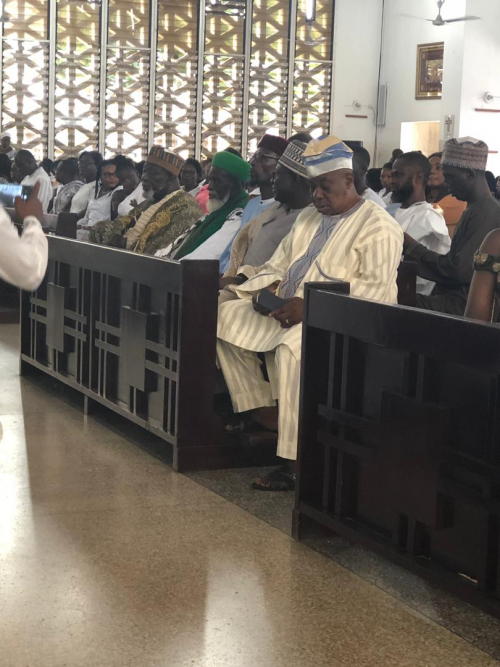23 April 2019 at 04:24
CHIEF IMAM AT 100, AND HIS PRESENCE IN A CHURCH
My dear brothers and sisters, I’ve been very sad reading through the messages on the NCI’s visit to the church since yesterday. My sadness stems from the accusations and counter accusations that are flying about, especially the accusation that some people are judging the NCI. We have forgotten that accusing someone of judging another may constitute a case of judging the person you are accusing, so I will urge that we give other people the benefit of the doubt when commenting on issues. It is possible that the person expressing unease or disapproval of the NCI’s visit is simply confused.
Sometimes a criticism can also be borne out of love or concern. The person who seems to be criticizing or expressing unease may love and respect the NCI far more than the one expressing support for his actions, so it’s important we focus on addressing issues rather than accusing others of being judgmental.
There have been very important concerns raised here, which the NCI or the gurus around him may not have thought about: (a) the danger of some Muslims of weak eeman or knowledge of Islam visiting churches and losing their faith because they saw the NCI in church with a pastor placing his hand over his head and blessing him; (b) the possibility that some Christian preachers may pursue such Muslims for conversion using the NCI’s presence in church receiving blessings; (c) the confusion as to whether, Muslims should believe in the death and resurrection of Jesus, and many others.
For people in privileged positions, it is not enough to do something simply because it is not wrong. The NCI may have the best of intentions, but his actions go beyond his personal intentions. His good actions go a long way to keep Ghana peaceful and united. In the same way when ordinary Muslims get confused about the meaning of his actions, it can have a negative impact on their faith.
The peace and unity of Ghana should not come at the expense of the faith of ordinary Muslim or their pride in their faith, neither should we endanger the peace and unity of Ghana in an effort to maintain our faith. The NCI has a primary responsibility to help Muslims maintain their faith and identity, so this issue goes far beyond the question of whether what he did was right or wrong. In discussing it, we must look at the interest of the generality of the Ghanaian society and in particular the Muslim community; especially those with very limited knowledge who can get confused with the slightest ambiguity in the actions of their leaders.
Now that it has happened, I suggest that we go beyond the debate on whether it is permissible in Islam for a Muslim leader to do that or not and look to the future. That debate will never be settled, and I hate taking part in a debate that will hardly produce any benefit. I think that if the following measures were taken prior to the visit, it would have addressed some of the questions and concerns arising from the event. I suggest the office of the NCI should consider them in any future “peace missions”, whatever the form these missions may take.
1. Announce the activity ahead of time, stating the goals and intentions. Don’t “pull a surprise” on ordinary Muslims and leave them gasping for answers. The office of NCI may only be second to the office of the president, so his movements and activities should be made known even before he embarks on them.
2. Consider the potential challenges such as those expressed above and address them in a written speech during the event.
3. Consider the timing. If this visit had taken place on any ordinary Sunday, I don’t think it would have raised so much concerns.
4. Address the media (and the people of Ghana for that matter) after such events and answer any questions or address matters arising from such events.
May Allah guide us to maintain our eeman, protect the NCI and all our leaders, and help them to be the best example for the generality of the ummah.
Credit: Dr Hudu Fusheini, Snr Lecturer, UG
